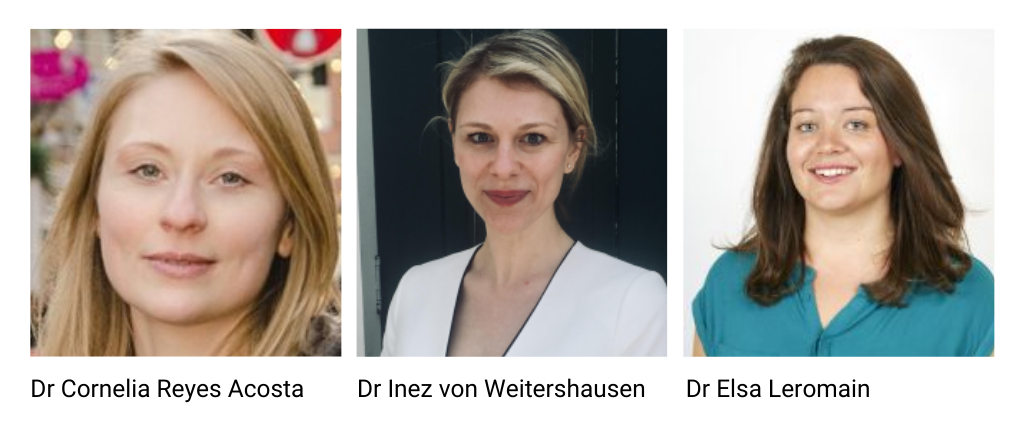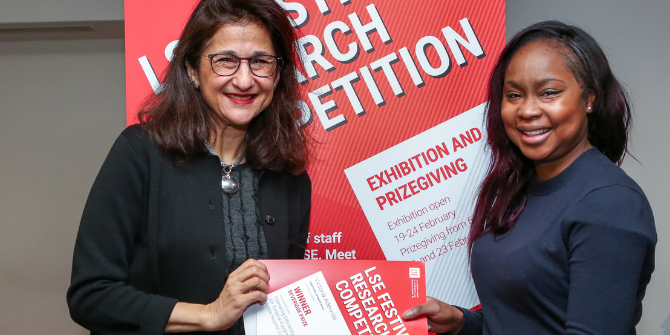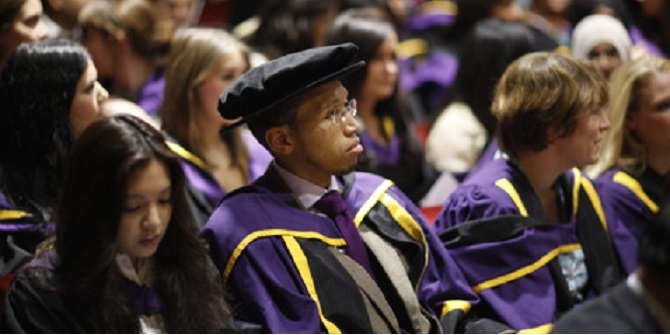Messy starts are common in academic careers now, with the benefit of a few years’ experience and with hindsight, three speakers at our recent panel explained how they managed the process from PhD student to academic worker roles. With the benefits of web technology, three LSE alumni speakers were able to join us to share their experiences and insights.
 Dr Cornelia Reyes Acosta, Lecturer in Digital Methods, Kings College London. LSE PhD Media and Communications, 2017
Dr Cornelia Reyes Acosta, Lecturer in Digital Methods, Kings College London. LSE PhD Media and Communications, 2017
Dr Elsa Leromain, Research Economist, Universite Catholique de Louvain and previously LSE Centre for Economic Performance. PhD Economics, Paris School of Economics and University Paris 1, 2017
Dr Inez von Weitershausen, Research Fellow, Massachusetts institute of Technology, Sloan School of Management & Taskforce on the Work of the Future. LSE PhD, International Relations, 2017
A few of the key themes emerging from their reflections on their experiences are summarised here:
Elsa highlighted the importance of making her own choices. She acknowledged there are things she loves and things she hates about academia. During her two-year post doc at LSE (working on the impact of Brexit on the UK economy) she thought hard about what she wanted from her future life and career. In part, applying for jobs outside academia and being interviewed by other organisations, helped Elsa figure out what was truly important to her. She realised she had crucially undermined the freedom to conduct her own work autonomously in academia, while still not being a fan of short-term fixed contracts and its combative nature. With this in mind, when she was offered another interesting post doc, she negotiated hard on the length of the contract. She kept the colleagues in Louvain waiting for her response while they increased the contract, they offered from one year to three years. Other factors included the city where she’d be based and the capacity to publish her own work. Looking at the numbers of PhD students against the number of tenured academic positions showed Elsa that not everyone can stay and expect a permanent position in academia, so Elsa keeps her mind open about what might come next. She is open about her continuing doubts about her future career and has learnt to live with the lack of certainty while enjoying the autonomy to conduct and publish her own research.
Inez found her first post by using the findapostdoc website and has experienced a series of three one-year post docs at MIT, during which she collaborated with academics from a wide range of departments. Inez describes universities as places for research, teaching, knowledge transfer and service and says that every university fulfills these roles in their own unique way. It is therefore important to properly research the institution you want to join. As employing organisations, they offer countless opportunities for leadership and learning. This holds in particular for large institutions like MIT, with its different schools, departments and centres. Since joining MIT as a postdoctoral researcher in May 2017, Inez sought to explore this diversity in all possible forms, while identifying the topics and space(s) that she would like to contribute to in the future. At the same time, she underlines that she has been extremely busy throughout the last three years and that uncertainty was a key characteristic of her life during that time. She describes the stress associated with working 80+ hours per week, obtaining visas on time, the high cost of living in the Boston area, and the insecurity towards the end of each contract. She stresses the cost of committing to this type of academic working life and encourages you to be very thorough in understanding what your are willing to give and for how long. Summarising her experience, Inez says she is pleased to have learned a lot and that she got involved with many different projects. She also feels fortunate to have worked at an institution with so many extraordinarily talented individuals.
In terms of career development, Inez is planning her professional future after MIT, and is looking forward to continuing working on the issues for which she has developed a passion. She is grateful for the inspiration she got by working with talented students, staff and faculty and knows that the excellent relationships she formed with colleagues, and the friendships she has made, will accompany her as she moves on. As during your PhD, the people and the relationships you form really matter.
Cornelia applied and was interviewed for a number of positions before being offered and accepting her Teaching Fellowship at King’s College London; initially this was an 8 month fixed term contract to teach one course and provide student supervision. Her field is growing, Digital Humanities departments are increasingly attracting students, so Cornelia was in a good place for new permanent positions. (These are typically 40 + 40 + 20% research, teaching and administrative positions.) When one was advertised, she applied as an internal candidate, went through all the standard KCL recruitment processes and was offered it. She describes this recruitment process as tough. It required being able to present how she fits in the department in terms of:
- How she will contribute to the Research Excellence Framework, July 2020 (single authored articles and monographs)
- Which modules she can teach and how she can extend these; her capacity for team teaching and to be flexible, teaching beyond her current experience
- How she fits with the student body and will sustain excellent student satisfaction scores.
It also meant that being able to apply the topics discussed in their PhDs in a flexible manner. Thereby, panels are not necessarily that interested to see what you did in your PhD, but rather how you can apply your theoretical and methodological skills to expand the expertise of the department. The interview panel often includes people who are not necessarily experts in your field (for example: If you interview for a position in English at a Humanities Department your panel could be comprised of experts from History, Music, French, etc). Cornelia worked hard to research the people on her panel so she could engage with them and their work. She read some of their recent articles and used this information to engage with them. The respect she showed for their work and how her field interacts with theirs created a comfortable atmosphere and easier discussion. It helped the panel understand the value of what she was offering.
Working as a good colleague means taking on administrative roles and Cornelia has experience of two during her time at KCL. Firstly, as Admissions Tutor, liaising with professional service colleagues to meet department targets for getting the most promising candidates into the respective programmes and now as the departmental lead on impact for the REF submission. This means collecting case studies from colleagues about the impact their academic research has had on the general public, through policy makers, and requires written testimonial letters from external participants. The 40:40:20 ratio does not always apply in practice and changes depending on what time of the academic year you are in (you’ll probably have a lot more time for research over the summer months when students are not on campus). The administrative load is high and Cornelia has discovered the huge bureaucracy behind the scenes in higher education.
In terms of career development, Cornelia has learnt how the curriculum operates, how to put together a good course and write a catchy abstract. In terms of promotion, Cornelia described the effort involved in progressing to Senior Lecturer or Associate Professor. The requirements in terms of publishing, teaching and administration are significant and she has had doubts about her commitment to this. Individual staff have to submit their own lengthy application with support from their department. Over the past year, she has had open conversations with her Head of Department about her commitment to academia and has taken the decision to resign from her permanent post in a nice department to pursue more entrepreneurial activities. The personal and professional reasons for this include the desire to stay living in London, the salary expectations and her personality type. She believes she will be happier and more fulfilled in her new role and invites us to check with her in one year to review this decision.
Reflecting back on their PhD work, all the panelists mentioned the increased perspective they have now gained on their PhD work. During the time since submission they have developed a greater understanding of the context of their work, the contribution it makes to the wider field, their place in that field and the other skills developed during their studies. Now, moving on from the initial messy stage, they all feel confident in the value of their studies and their capacity to make meaningful contributions to their different fields.
Inter-disciplinary PhD Career Panels are arranged every term, check out all the events for PhD students on CareerHub.





